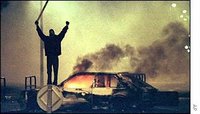
Date: Wed, 9 Nov 2005 07:33:47 -0800
From: Sarah Ruddy
Subject: Association
To: 6010@LISTS.WAYNE.EDU
(the image is which actually from riots
in Toulouse.)
....
Yesterday in 7520, we talked briefly about Burroughs
"Electronic Revolution." Burroughs based his "cut-up"
technique on a very textual understanding of power
structures and social formations. This led him to the
idea that control "depends on laying down lines of
association." Jill, you're in this class, feel free to
step in if I'm wrong or something. These lines of
association could be equated with "conventions." His
revolutionary writing practice is then based on
rupturing the lines of association that manipulate us.
It's not so much that this is a new idea, but
Burroughs presents it in a way that underscores how an
exercise of power and the resistance of it are forms
of "writing." The disruption of accepted lines of
association introduces the possibilities for freedom.
This makes me think about a 1020 course based on
Burroughs, looking at "texts" that reinforce lines of
association and texts that explicitly resist them. A
good example of the former might be the BBC report on
the Paris riots that I exerpted on my blog. It relies
on lines of association to make it seem like the
"Algerian Curfew Law" is justified. Many mainstream
news reports, if examined closely, base their logic
not on, well, logic, but on associational connections
- ie conventions. The Five paragraph essay does
something like this too, which is why it's a joke as a
form. Then you have your "rupturing" text, which in
this case might be the photograph I also posted on my
blog (reposted below). It's a beautiful image of
rioting. How is this disruptive? Well, why is it so
beautiful? How do we respond to the rioter's
simultaneous joy and anguish? Lines of association
don't give us an answer.
I guess as a syllabus, this could also be extended to
reading social movements and revolutions. Where, for
example, were segregation's lines of association? How
did the civil rights movement rupture them? This is a
historical text which would have continued to be read
via association if those lines hadn't been severed by
people like Rosa Parks.
The assignments for a class like this could range from
close readings of texts like ads and news reports to
smaller cut-up projects to a larger analysis of a
social movement told in cut-up mode. Obviously, there
is a lot here that we already read about, including a
hip-hop logic and Haynes' troubling of "ground."
Reading the Burroughs essay really made it come
together for me.
No comments:
Post a Comment